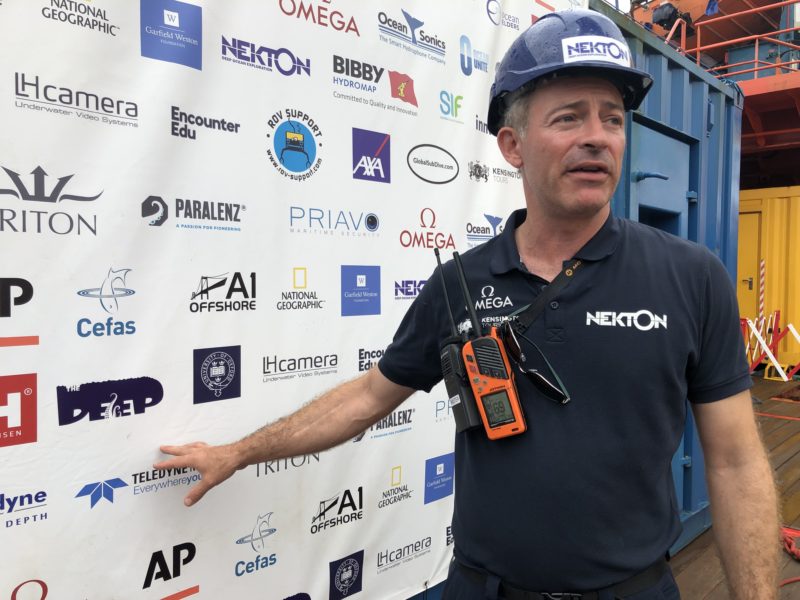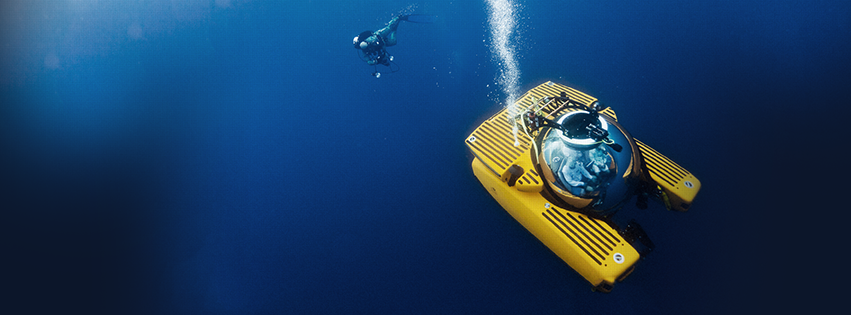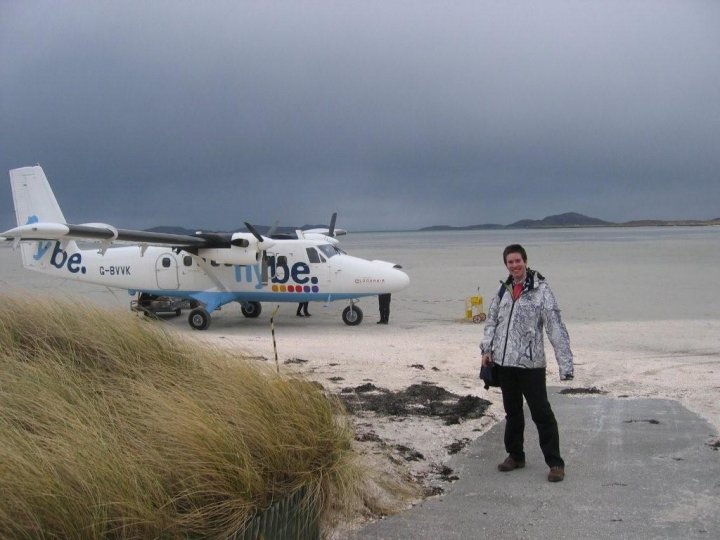I am fortunate to have quite a few really fantastic friends. People who not only do the most amazing things, but who are also really good human beings. One of them is Olly Steeds who I have known since 2002. He is one of these guys who stands by you in the worst and best of times. A genuinly good human being. He is also one of the most visionary of my friends. And right now, he has a mission in front of him, which i believe will be not only historical but also make a big difference to how we see our globe. Let me introduce him to you.
Oliver Steeds has led expeditions across the Gobi desert, lived with tribal people in West Papua, the Amazon, Congo and a dozen other locations. He’s also reported on terrorism in Yemen, slavery in Niger, human trafficking from North Korea into China, and exposed government and corporate corruption among many other assignments. Now he’s launching Nekton to explore the deep ocean. I caught up with him ahead of his first Mission that starts on the 14th July.
[PS: he’s a critically acclaimed investigative journalist so we asked him to source all of his facts!]
Here’s a short video to set things up:
Let’s start with the big picture: why do we need to explore the deep ocean?
Exploration is the discovery of new knowledge that can help humanity move forward. The deep ocean is the beating heart of our planet, the most important part of the planet, but it’s the least known. This can’t be sensible.
Why is the ocean the heart of our planet?
It’s 99% of the planet’s biosphere[1], regulates our atmosphere and climate and produces 50% of the oxygen we breath[2], possibly, according to some scientists, considerably more. It captures carbon dioxide which dramatically reduces global warming and provides a primary source of protein for 3 billion people[3]. The problem is that we don’t know how the deep ocean functions, how healthy it is and how resilient it is.
What do we know at the moment?
We know we need a healthy ocean to continue life as we know it. It’s undergoing its most severe disruption for at least 250 million years[4]. Its acidity has increased 30%[5] since the beginning of the industrial revolution. We’ve lost at least 27%[6] of our coral reefs in the last 50 years and the majority of our global fish stocks are overexploited, depleted, or recovering from depletion and there are thought to be at least 5 trillion[7] pieces of plastic debris in the ocean. It’s a pretty dark picture and yet it’s barely on the agenda in the corridors of power, boardrooms and classrooms.
So the deep ocean is the most critical part of our planet. How come it’s the least known?
It’s down to investment. Trillions have been spent on space exploration but only a tiny fraction has been spent on exploring the ocean. I heard that NASA’s PR budget is more than double the entire Ocean Sciences budget in the United States. We’ve only biologically sampled 0.0001% of the ocean[8] and we have better maps of Mars and the Moon than we do of our seabed.
How much of our seabed have we mapped?
We’ve only mapped an area equivalent the size of Tasmania to the same kind of detail that we have mapped the entire orbs of Moon and Mars[9].
So the idea that there is nothing left to explore on our planet is nonsense?
Yup. But now we’re confronted by a race – to discover it before it’s destroyed. We need a new golden age of exploration to drive our progression and transform our relationship to our planet.
I know you’ve been working on this for a while now, first investigating what’s happening to our ocean and figuring out what can be done. And your answer, or rather your contribution is Nekton. So you’ve just set up Nekton…what’s the plan?
Nekton is a UK-based, charitable, scientific research foundation. Our mission is to explore the deep ocean. Our only client is the ocean. Our goal is to be positively disruptive and find innovative ways to exponentially accelerate our scientific understanding of how the deep ocean is changing.
What I find powerful about what you are doing is that you’ve pulled together an extraordinary alliance of partners to join forces. UN, Ocean Elders, Canadian Government, IUCN, the insurance company XL Catlin, the leading sub-sea technology firm Teledyne Marine, the top submersible manufacturers, Triton, a dozen marine institutes – more than 30.
Our Alliance is critical to our success. We combine our resources to deliver our scientific research missions to diagnose the health of the deep ocean. This means bringing the deep ocean to life through 360-degree Virtual Reality films and global news coverage while at the same time delivering educational programmes to inspire a new generation and accelerate ocean literacy. All this is focused towards maximizing the media impact we have with the ultimate objective of changing international policy to improve ocean stewardship.
Your first Mission to Bermuda and the North West Atlantic starts in the next few days. What’s the science focus?
Our research programme, the XL Catlin Deep Ocean Survey, is investigating the state of the deep ocean – its function, its health and its resilience. But first we need to establish a baseline of parameters such as chemical make-up, temperature, biodiversity, pollution etc etc to establish a starting point for future studies. We’re deploying cutting-edge technology including Human Operated Vehicles (HOVs) and Remote Operated Vehicles (ROVs), to gather physical, chemical and biological data.
You’re now a submersible pilot, Sub Commandante Steeds. Are you living out your Captain Nemo Fantasy?
Have you been talking to my wife again?
Of course. The submersibles are at the heart of your missions to the deep. What submersibles are you using?
We’re using two cutting edge Triton submersibles with transparent acrylic pressure domes which give scientists an unparalleled platform for observation. This provides greater visual and 3D perspective on the environment, generating more contextual information to make better interpretations of data as conditions and parameters change.
What scientific research work can you do with them?
They have an excellent scientific payload so we’ve adapted the submersibles with the latest scientific and filming equipment to enable our scientists to conduct physical, chemical, biological and geological studies to view and sample organisms and processes in their natural settings.
Your submersibles are yellow. Were the Beatles onto something?
On something?
On TO something?
Absolutely. We all need to live in yellow submarines. Jacques Cousteau had a yellow one too. Turns out, yellow is a good bright high visibility colour for the ocean so there’s a very practical reason for it.
I prefer the Beatles reason. A question from my daughter… Will you see monsters?
It depends on your definition of a monster…. But I hope so. The deep ocean is home to some of the most weird, wonderful, and some would say ‘alien’ species on our planet. Have you seen the Goblin shark? There are species that have not been discovered and we know that the deep creates – to our eyes at least – strange and alien creatures. We’re not expecting to find Godzilla but one day I’d love finally capture the Colossal Squid on camera – it’s the size of a minibus.
Back to the Mission… how will one mission change our understanding of the deep?
It won’t. This is only the beginning. Our Mission this summer is piloting the development of the first standardised framework that will enable scientists globally to collaborate on a global study on the state of the deep ocean. We’ve got Missions planned on the years ahead…
What is unique about your approach to scientific research?
The research framework provides scientists with a new standardised way for measuring physical, chemical and biological indicators and thereby assessing the function, health and resilience of the deep ocean.
What makes you different from the others out there?
Uniquely we’re developing a new standardised scientific research framework which will enable scientists globally to apply the same approach and collaborate on a global study on the state of the deep ocean. Through collaborating on this standardised approach we can accelerate our understanding of the deep ocean.
You’re also focused on maximizing impact?
Absolutely. Otherwise why bother? The clock is against us. It’s the Race for the Deep that I mentioned before. So our missions are focused on areas where we can maximise impact – rapidly assessing the state of the deep ocean in priority areas, generating public, civil society, business and government awareness to inform and catalyse the legal, economic and political decisions to improve ocean stewardship.
Good luck. After BREXIT, it’s good to see some Brits leading the way on international collaboration on such a monumental scale. How can we follow you during the Mission?
We’re reporting live from the Mission – including in 360 and you can follow us on our website, YouTube, Instagram, Facebook and Twitter. We’re ramping up from 17th July so tune in…
Website: www.nektonmission.org
Facebook: www.facebook.com/nektonmission
Twitter: https://twitter.com/nektonmission (@nektonmission)
YouTube: https://www.youtube.com/channel/UCMrYQWm0FZm6vXI1iS99cWA
Instagram: https://www.instagram.com/nektonmission/
[1] http://www.un.org/sustainabledevelopment/oceans/
[2] http://earthsky.org/earth/how-much-do-oceans-add-to-worlds-oxygen
[3] http://www.worldwildlife.org/industries/sustainable-seafood
[4] http://www.earthsurfaceprocesses.com/3c-E-MassExtn.html
[5] http://www.pmel.noaa.gov/co2/story/What+is+Ocean+Acidification%3F
[6] http://wwf.panda.org/about_our_earth/blue_planet/coasts/coral_reefs/coral_facts/
[7] http://news.nationalgeographic.com/news/2015/01/150109-oceans-plastic-sea-trash-science-marine-debris/
[8] www.marineboard.eu/file/265/download?token=J5hokhHB
[9] http://www.motherearthnews.com/nature-and-environment/nature/fun-surprising-facts-about-the-oceans.aspx


